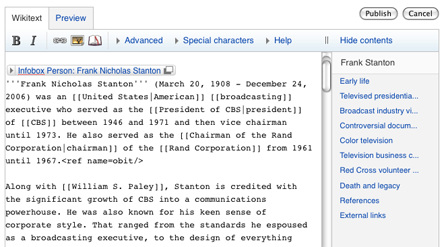Wikipedia, the online user-created encyclopedia and the number six website on the Internet today, is about to get a makeover. And it’s a big one. According to a blog post from the Wikimedia Foundation User Experience team detailing the changes, the upcoming Wikipedia redesign, due to launch April 5, aims to make the site easier to navigate, easier to search and, perhaps most importantly, easier to edit.

Easier is Better
The upcoming design called “Vector” has been in use over the past six months by a group of 500,000 beta testers. Included in the update are changes like simplified navigation, a relocated search box, clutter reduction and even an updated Wikipedia logo. Also, all English Wikipedia users will soon be able to create PDFs and printed books from Wikipedia articles, a service previously available only to logged-in users.
However, the most interesting change is how Wikipedia is making the page edit functions easier. A new toolbar will be provided which lets editors more easily insert links and tables, and an included cheatsheet will help users access the most commonly used functions.

These editing changes launching next month are only the beginning, notes Naoko Komura on the Wikimedia blog. Later this year, the site will see even more radical revamps to the editing process. This includes the following:
- Reducing the amount of wiki code users see in the edit system and making it possible to change data in tables and information boxes through simple forms.
- Cleaning up the edit page itself, to use more understandable language and get rid of confusing clutter.
- Providing a new outline tool to navigate a long article while you’re editing it.
Wikipedia Needs More Editors
Now the question is whether or not these changes will encourage more people to actually edit the online encyclopedia because, surprisingly, few users actually do.
Wikipedia is often heralded as a shining example of how there’s power in the “wisdom of the crowds,” a phrase that implies how a diverse collection of individuals can be more accurate than individuals or even experts. However, the dirty little secret about the supposedly “crowd-edited” online encyclopedia is that, even though anyone and everyone can edit it, few do so. In fact, only 1% of Wikipedia users are responsible for half of the site’s edits. Wikipedia’s founder, Jimmy Wales, has even been quoted as saying that the site is really written by a community, “a dedicated group of a few hundred volunteers.”

Given these statistics, it’s no surprise that Wikipedia wants to make some changes. Recent reports point to slowed growth, a downward trend that may be partly to blame on the increasingly complex editing process, according to some experts.
Dr. Ed H Chi, a scientist at the Palo Alto Research Center in California, told the Telegraph that the site had become a “more exclusive place”, where only a handful of the most experienced editors were responsible for editing and maintaining the site.
In other words, Wikipedia became a site that wasn’t representing the “wisdom of the crowds” anymore, but the “wisdom of an elite group.” That in, turn, may have caused the slowdown. Over the past several years, the number of new articles per day has dropped from 2,200 in July of 2007 to 1,300 today.
Is It Too Late? Or Just in Time?
By simplifying the editing process, Wikipedia could potentially reverse this trend – at least, that’s likely what they’re hoping will occur. According to the Q&A on the changes, the organization is aware of these very issues:
When knowledgeable people cannot participate in editing Wikipedia because they find it too confusing or difficult to edit articles, it is a serious problem that undermines the potential quality, breadth and depth of the content that we can offer to you […] When it was first developed, the software running Wikipedia was considered reasonably user-friendly. By today’s standards, it is not as streamlined nor user-friendly as other software.
But has the organization waited too long? Have mainstream Internet users already given up on being a part of the editing process and are now happy just to read? We’ll know soon enough. Rollouts begin in April, starting first with media repository Wikimedia Commons and then followed by Wikipedia itself later that month.

















